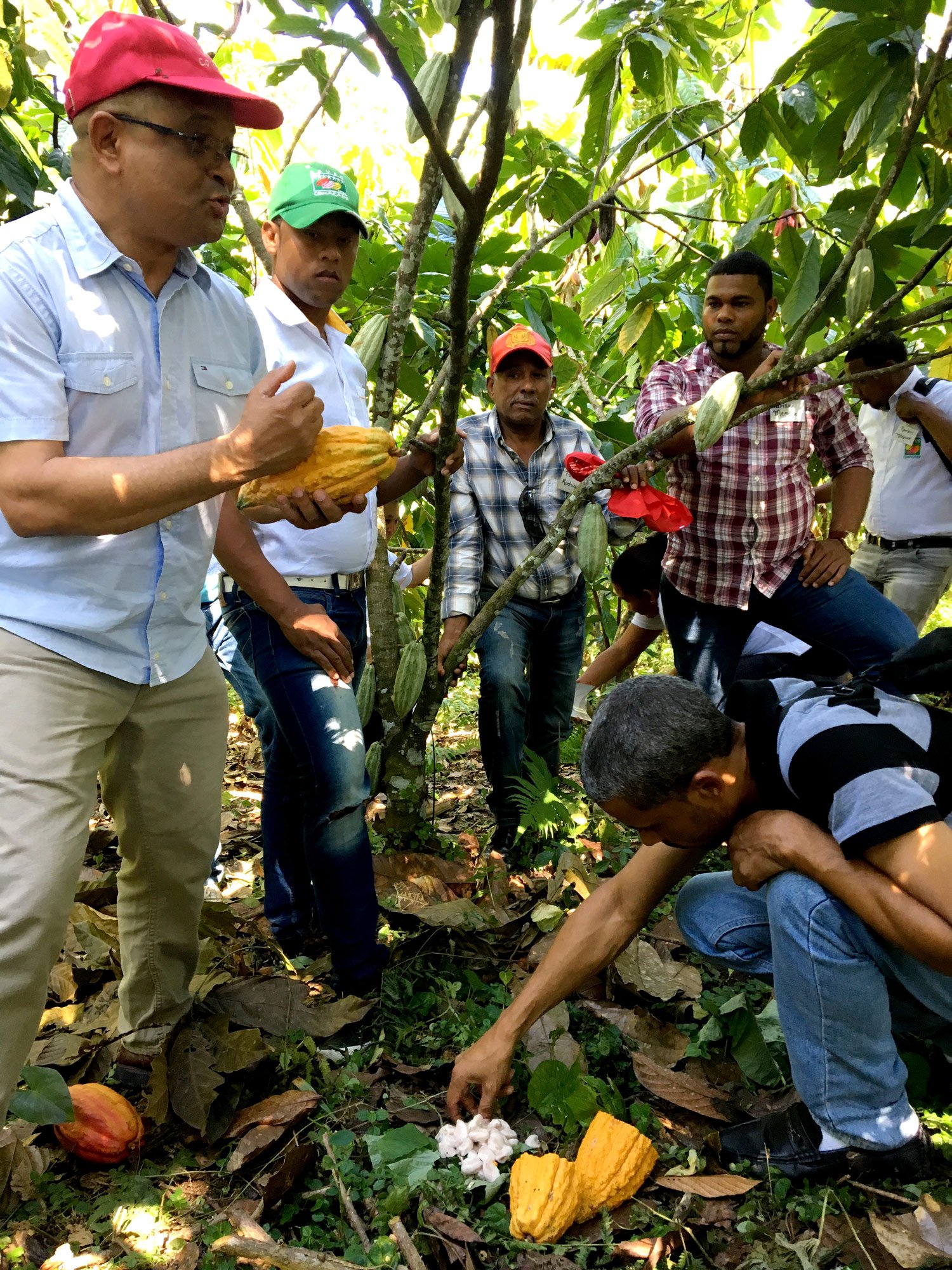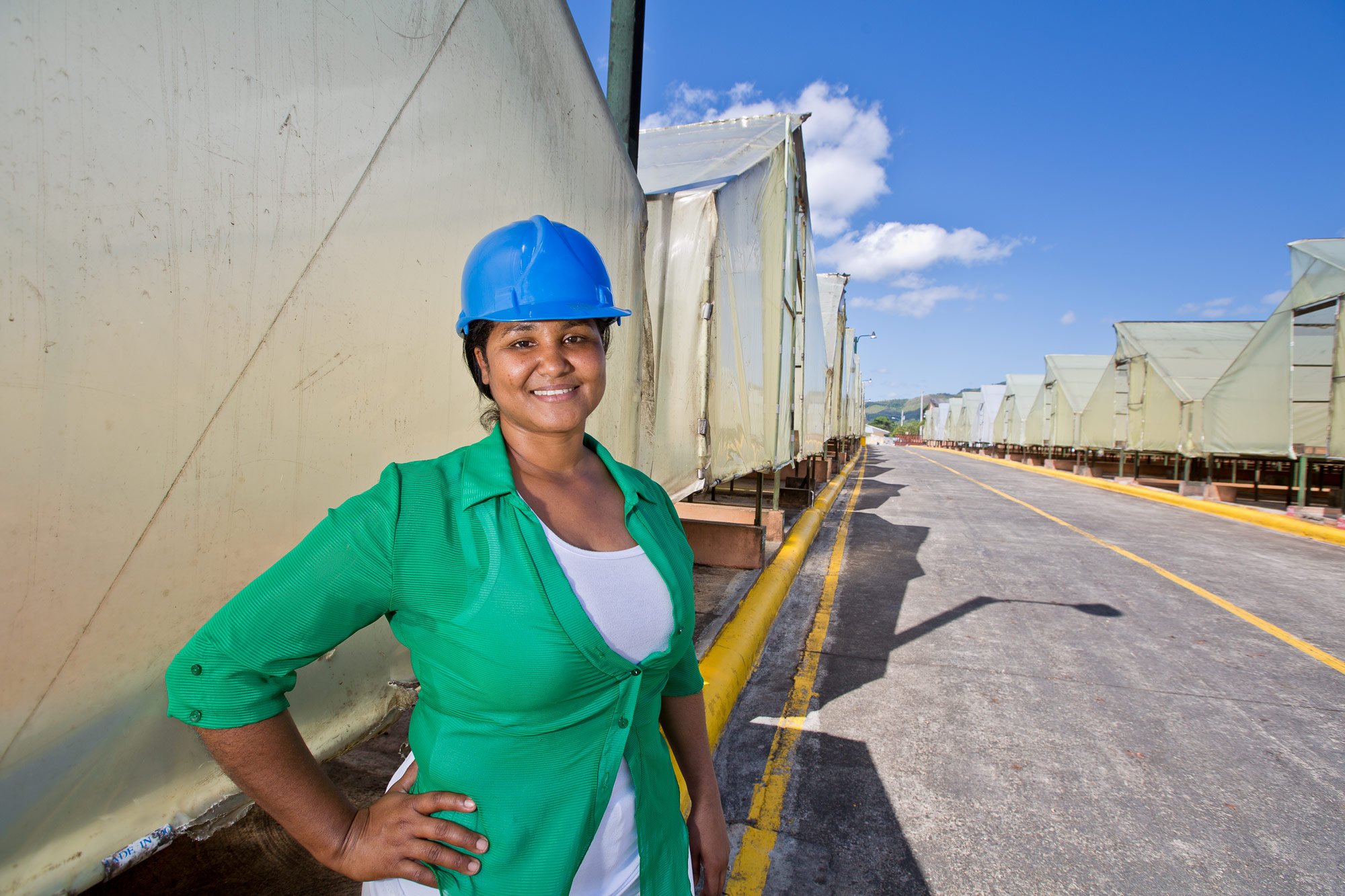CONACADO
Equal Exchange’s Carlos Semedo (far left) and Dary Goodrich (far right) visit with CONACADO co-op members.
Co-op Name: CONACADO
Location: Dominican Republic
Number of Producers: 9,298
Average Farm Size: 3 hectares
Total Area Under Organic Production: 26,501 hectares
Founded: 1988
Source For: Non single-origin chocolate bars and minis, baking cocoa, hot cocoas
Interesting Fact: CONACADO was the first cocoa co-operative that Equal Exchange began working with when a hot cocoa product was introduced in 2002.
Full Profile: CONACADO began as a development project in 1985 during a low in the global cocoa market, to study how cacao fermentation techniques could improve the quality of cacao production in the Dominican Republic. After successfully proving that higher quality, fermented cacao could increase income to small farmers, CONACADO expanded its work to educate cacao farmers and organize them into "bloques" – associations of farmers in a particular geographic area. CONACADO then entered a commercialization phase of the project and focused on finding niche markets for their high quality cacao.
Over the past 20 years, CONACADO has grown from 700 members organized in 3 bloques, to over 9,000 members organized in 9 bloques (blocks) with 142 local community associations throughout the Dominican Republic. Each of the bloques has a similar organizational structure: a General Assembly that meets once a year to approve work plans and decide how Fair Trade premiums will be used; an Assembly of Delegates, with two delegates per association, that meets once a month to report on work plan progress at the community level; a Governing Board that meets once a month to execute the work plan; and an Administrative Committee that meets once a week to follow up on the work plan to make sure it is going as it should.
Prior to the formation of CONACADO, 100% of Dominican cacao production was low quality unfermented beans shipped mainly to the United States. These beans were purchased from the roughly 40,000 cacao farmers by the four major Dominican exporters who held a strong grip over the local market. Today, CONACADO members produce approximately 25% of the cacao exported from the Dominican Republic and the organization has become a powerful alternative for small-scale producers. The co-operative's success in quality improvement and marketing means that 70% of their cacao is sold as high quality fermented beans, primarily to European niche markets: Organic, Biodynamic, and Fair Trade.
Over 40% of CONACADO's cacao is sold on the Fair Trade market. Each year the co-operative's Fair Trade premiums are distributed to the bloques for use in community projects, which have included:
Education: School supplies and scholarships for members' children; repair & build schools; training for the children of cacao producers in administration so they can eventually take farms over from parents.
Infrastructure: Road projects to connect isolated producers with their neighbors; wells for potable water in communities; houses for members unable to purchase a home on their own; electricity projects; collection centers in communities to reduce distance and travel time from harvest to fermentation.
Health: Medicine for health clinics; contact doctors for procedures in clinics; repair clinic buildings.
Development: "Cacao Route" eco-tourism project to diversify income source for cacao farmers, and share CONACADO model; grants to women's organizations producing cacao wine, chocolate, and baked goods.
The biggest challenges facing CONACADO today are the development of infrastructure to produce more high quality cacao and generational turnover where youth are not interested in taking over the family farm. Regardless, CONACADO continues to grow, invest in needed infrastructure, and advance its primary goals to maintain leadership, improve the standard of living for small cacao farmers, support sustainable community development, and preserve the environment.
If you would like to learn more about this partner, please read their Partner Profile (PDF).






